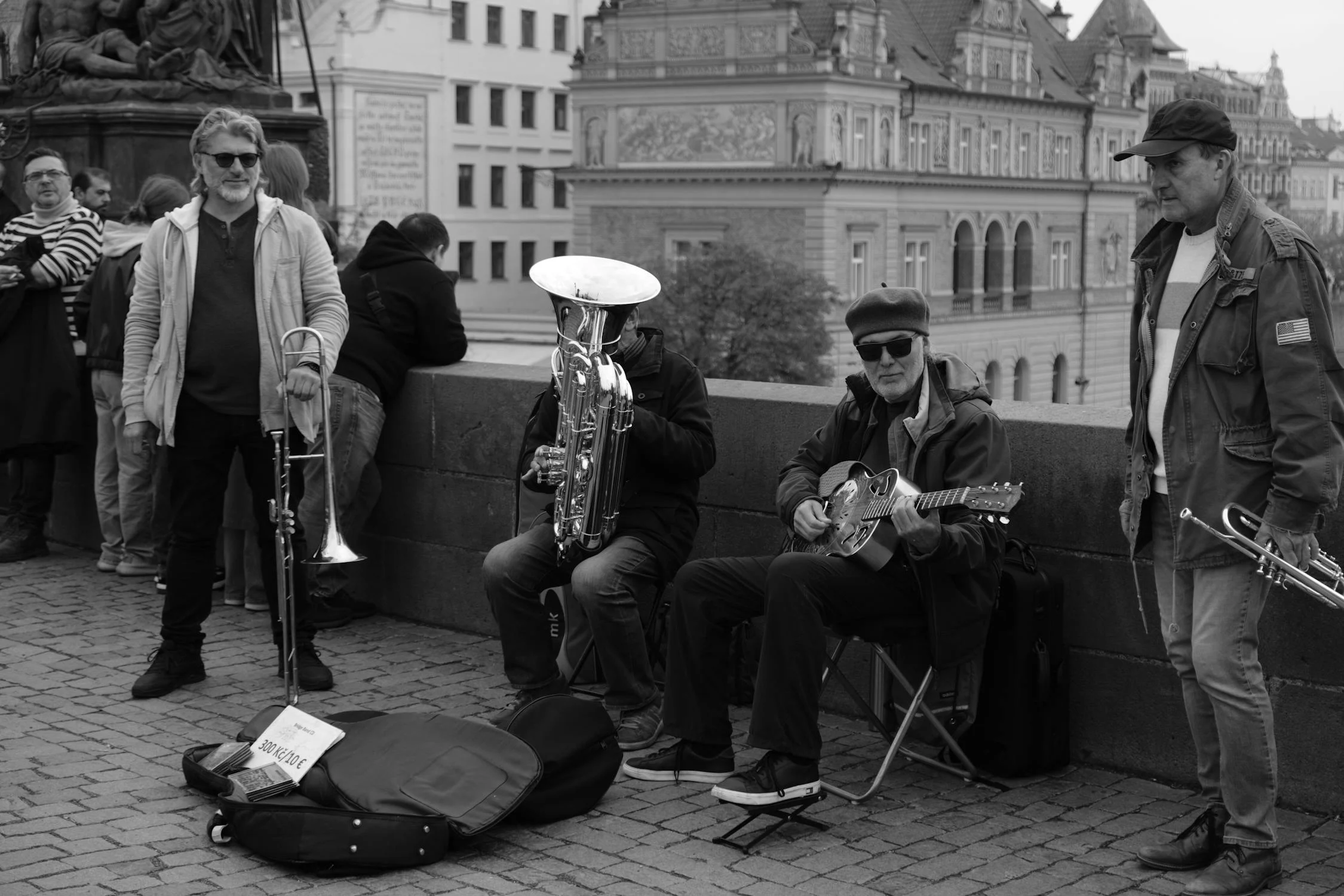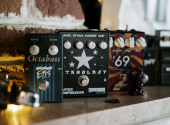
The Guitarist's Survival Guide: Words of Wisdom for Prague's Musicians
Prague's music scene hums with a vibrant energy that occasionally spills over into delightful chaos. To benefit from some hard-earned wisdom, I canvassed some opinions from some of its professional musicians. Their often wry and knowing insights provide a unique peek behind the curtain of their gigs. Here are some of their words of wisdom.
"Learn to love playing with earplugs. Don’t ruin your hearing playing gigs at an Irish bar."
Right off the bat, a dose of stark reality served with a side of pub-specific caution. It's easy to get caught up in the energy of a packed venue, especially when the drinks are flowing and the crowd is rowdy. However, pragmatism persists; If you plan on doing this for the long haul, prioritise your hearing. Good earplugs are a smart investment.
"There is no best type of string, pick, cable, amp… Your playing experience is just cause and effect of the tools you use. If you played an out-of-tune guitar plugged into a Hello Kitty clock radio, that combination of things + your skills would cause you to compose/play differently than if you had a Marshall stack. Neither is better or worse."
The reason you can always spot a great guitarist is their personal touch – the unique way they attack the strings, their specific phrasing, and their overall musical sensibility. That inherent style is so strong it often overshadows the sonic characteristics of any particular guitar or amplifier they might be using.

"Performance is more important than tone. Don't redo a good performance because you think the new amp/microphone/preamp will 'sound better'. Take the good performance with the shit tone 100% of the time."
Sometimes, you just know when a performance has that special something. Don't second-guess yourself based solely on sonic considerations. Trust your gut.
"Learn a Bob Marley song before you learn Yngwie Malmsteen."
This isn't about dissing the shred gods, but it's a fantastic point about building your musical house on a solid foundation. Bob Marley's music, with its infectious grooves and deceptively simple melodies, teaches you about feel, rhythm, and the power of space. Those are the fundamentals that underpin all great music, regardless of genre. Walk before you run!
"Transcribe solos to get vocabulary."
Treat transcribing solos as your advanced musical studies, and open your ears beyond the guitar! Analysing the solos of not only great guitar players, but horn players, saxophonists, and other instrumentalists will expose you to diverse techniques and melodic approaches. Every line you learn is a valuable addition to your overall musical lexicon, and you’re improving your ear too.
"Learn the CAGED shape of every chord quality and switch between them up and down the neck, also with a metronome on."
This advice points to a fundamental building block for any serious guitarist. It's not just about knowing chords, but about understanding their architecture and how they relate to each other on the neck.
"Arpeggiate 1/4 notes then 1/8 notes over the changes to songs."
Another very practical tip advocates practising this with both quarter and eighth notes. This helps develop your rhythmic precision and control, allowing you to create both sustained and more intricate arpeggiated passages.

"If you play covers, respect the source material. It’s popular for a reason…these songs are deep wells of meaning and resonance. Doesn’t mean you have to mimic every detail, but take it seriously."
Think of playing a cover as a tribute to a song that has stood the test of time. You're acknowledging its power and its impact. While your personal take is welcome, it should stem from a genuine appreciation for the original's essence.
"The audience is a mirror of your own internal state. Whatever you react to in them – their inattention, their fatigue, their distraction and ulterior motives, their failure to listen and meet you where you are – is also in you."
This quote challenges performers to take ownership of the audience's reaction. Instead of solely blaming external factors, consider what you might be contributing to the dynamic in the room.

"Capos are for slackos! Calling yourself a guitarist means more than just throwing on a capo and strumming a few chords around a campfire. Figuring out how to quickly and efficiently modulate a key is simple with the numerical system, all you need to be able to do is count to eight and you're set. If you're stuck on the same old boring chords, try practising inversions, arpeggio and chord extensions to really get an understanding of your neck and tonal relation. Once you've dedicated a little love and practice to these few things then you no longer have to go to parties with your capo awkwardly sticking out of your back pocket!
This musician isn't playing around – capos are for those who haven't put in the work! They advocate for the empowering knowledge of the Roman Numeral system and the rewards of exploring chord voicings and inversions all across the neck.
Do you agree or disagree? Leave a comment and join the dialogue!
These insights from some of Prague's working musicians offer a blend of practical survival tips and deeper musical philosophies. It's a reminder that the life of a professional musician is a journey of constant learning, adaptation, and a whole lot of heart. Now, if you'll excuse me, I think I need to go practice my arpeggios... without a capo, to a Bob Marley song.
If you have found an error or typo in the article, please let us know by e-mail info@insounder.org.




